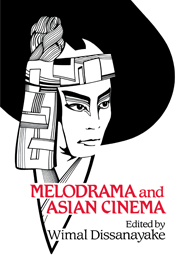Book contents
- Frontmatter
- Contents
- List of contributors
- Acknowledgments
- I Introduction
- II Melodrama / subjectivity / ideology: Western melodrama theories and their relevance to recent Chinese cinema
- III Symbolic representation and symbolic violence: Chinese family melodrama of the early 1980s
- IV The Goddess: Reflections on melodrama East and West
- V Melodrama as historical understanding: The making and unmaking of communist history
- VI Melodrama, postmodernism, and Japanese cinema
- VII Inscribing the subject: The melodramatization of gender in An Actor's Revenge
- VIII Insides and outsides: Cross-cultural criticism and Japanese film melodrama
- IX Psyches, ideologies, and melodrama: The United States and Japan
- X Negotiating the transition to capitalism: The case of Andaz
- XI The concepts of evil and social order in Indian melodrama: An evolving dialectic
- XII Politics of melodrama in Indonesian cinema
- XIII Power, pleasure, and desire: The female body in Filipino melodrama
- XIV The register of nightmare: Melodrama as it (dis)appears in Australian film
- XV Overview: What is American about film study in America?
- Index
XI - The concepts of evil and social order in Indian melodrama: An evolving dialectic
Published online by Cambridge University Press: 05 June 2012
- Frontmatter
- Contents
- List of contributors
- Acknowledgments
- I Introduction
- II Melodrama / subjectivity / ideology: Western melodrama theories and their relevance to recent Chinese cinema
- III Symbolic representation and symbolic violence: Chinese family melodrama of the early 1980s
- IV The Goddess: Reflections on melodrama East and West
- V Melodrama as historical understanding: The making and unmaking of communist history
- VI Melodrama, postmodernism, and Japanese cinema
- VII Inscribing the subject: The melodramatization of gender in An Actor's Revenge
- VIII Insides and outsides: Cross-cultural criticism and Japanese film melodrama
- IX Psyches, ideologies, and melodrama: The United States and Japan
- X Negotiating the transition to capitalism: The case of Andaz
- XI The concepts of evil and social order in Indian melodrama: An evolving dialectic
- XII Politics of melodrama in Indonesian cinema
- XIII Power, pleasure, and desire: The female body in Filipino melodrama
- XIV The register of nightmare: Melodrama as it (dis)appears in Australian film
- XV Overview: What is American about film study in America?
- Index
Summary
The objective of this chapter is to examine three of the most popular films made in India in relation to the concepts of evil and social order, and to analyze how these concepts as discursive practices have been undergoing a transformation as a consequence of diverse social and cultural factors.
Indologists, by and large, have subscribed to the notion that there is no problem of evil in Indian culture, and philosophers and religionists have sought to explicate it in relation to philosophical works. However, as Wendy Doniger O'Flaherty has ably pointed out, it is to mythology that we should turn if we are to obtain a clearer and more representative picture of the nature and significance of evil in Indian culture and imagination. As she says, “The theodicy that is developed in Hindu mythology demonstrates a more popular, general, and spontaneous attitude toward evil than may be found in the more complex arguments of the Hindu theologians” (O'Flaherty 1976, 8).
In the generality of Indian myths, evil is perceived as an outcome of greed and lust. According to the celebrated Indian epic The Mahabharata,
Formerly, Prajapati brought forth pure creatures, who were truthful and virtuous. These creatures joined the gods in the sky whenever they wished, and they lived and died by their own wish. In another time, those who dwelt on earth were overcome by desire and anger, and they were abandoned by the gods. Then by their foul deeds, these evil ones were trapped in the chain of rebirth, and they became atheists.
(O'Flaherty 1976, 23)- Type
- Chapter
- Information
- Melodrama and Asian Cinema , pp. 189 - 204Publisher: Cambridge University PressPrint publication year: 1993



